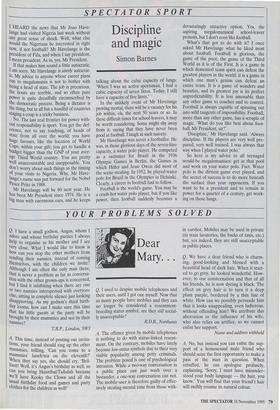SPECTATOR SPORT
Discipline and magic
Simon Barnes
I HEARD the news that Mr Joao Have- lange had visited Nigeria last week without any great sense of shock. Well, what else would the Nigerians be interested in right now, if not football? Mr Havelange is the president of Fifa, and when I say president, I mean president. As in, yes, Mr President. If that makes him sound a little autocratic, I am sorry. Mr Havelange is utterly autocrat- ic. My advice to anyone whose career plans run to megalomania is not to bother with being a head of state. The job is precarious, the hours are terrible, and so often pure Power is quite dreadfully circumscribed by the democratic process. Being a dictator is the thing, but in all but a handful of countries staging a coup is a tricky business. No. The last real frontier for power with- out responsibility is sport. You get the def- erence, not to say toadying, of heads of state from all over the world; you have huge favours, like the location of World Cups, within your gift; you get to handle a budget bigger than the GNP of your aver- age Third World country. You are pretty well unaccountable and unopposable. You don't worry about such things as the timing of your visits to Nigeria. Why, Mr Have- lalige's name was put forward for the Nobel Peace Prize in 1988.
Mr Havelange will be 80 next year. He has been Mr President since 1974. He is a big man with enormous ears, and he keeps talking about the cubic capacity of lungs: `When I was an active sportsman, I had a cubic capacity of seven litres. Today, I still have a capacity of five litres.' In the unlikely event of Mr Havelange proving mortal, there will be a vacancy for his job within, oh, the next 50 years or so. In these difficult times for school-leavers, it may be worth considering. Some might shy away from it, saying that they have never been good at football. I laugh at such naivety. Mr Havelange was never a footballer. He was, in those glorious days of the seven-litre capacity, a water polo player. He competed as a swimmer for Brazil in the 1936 Olympic Games in Berlin, the Games in which Hitler and Jesse Owen did most of the scene-stealing. In 1952, he played water polo for Brazil in the Olympics in Helsinki. Clearly, a career in football had to follow. Football is the world's game. You may be a crash-hot water polo player, but if you like power, then football suddenly becomes a devastatingly attractive option. Yes, the aspiring megalomaniacal school-leaver protests, but I don't even like football.
What's that got to do with it? I once asked Mr Havelange what he liked most about football. Football is glorious, the game of the poor, the game of the Third World as it is of the First. It is a game in which demented team spirit can defeat the greatest players in the world; it is a game in which one man's genius can defeat an entire team. It is a game of wonders and beauties, and its greatest joy is its perfect unpredictability. It is less amenable than any other game to coaches and to control. Football is always capable of spinning out into wild tangents of impossibility. Football, more than any other game, has a scruple of magic. 'What do you like best about foot- ball, Mr President, sir?'
`Discipline,' Mr Havelange said. 'Always discipline. If the players are very well pre- pared, very well trained. I was always that way when I played water polo.'
So here is my advice to all teenaged would-be megalomaniacs: get in that pool and work on your water polo. Fact. Water polo is the dirtiest game ever played, and the secret of success is to do more beneath the surface than your opponents. If you want to be a president and to remain in power for a quarter of a century, get work- ing on those lungs.


















































































 Previous page
Previous page